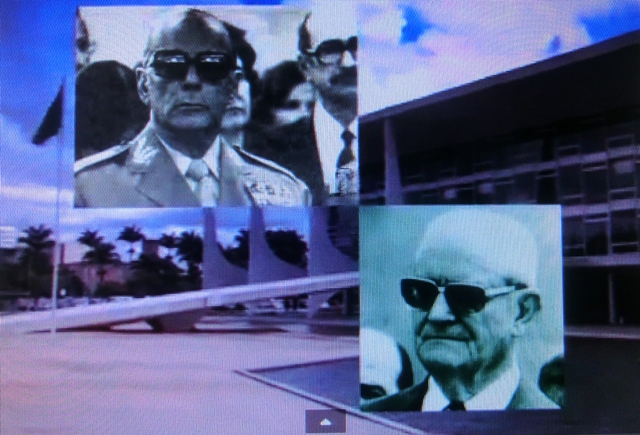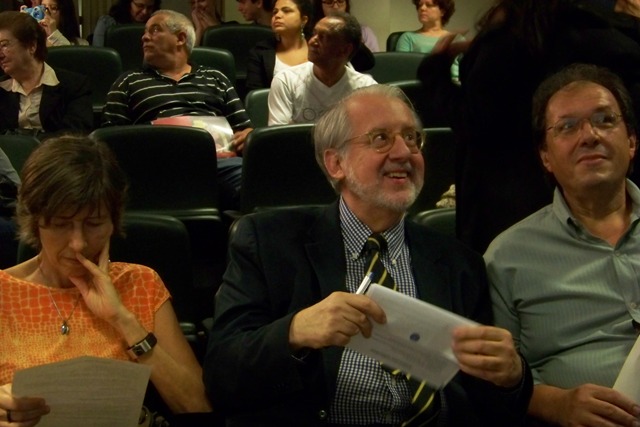Klaus Hart Brasilientexte
Aktuelle Berichte aus Brasilien – Politik, Kultur und Naturschutz
Brasilien, katholische Kirche und Militärdiktatur: Wichtigster Befreiungstheologe des Tropenlandes, Frei Betto, über den Jesuiten Renzo Rossi. Willy Brandt und Brasilien.
Fehlende Menschenrechts-Aufarbeitung des unter Vorwänden begonnenen Angriffs auf den Irak: http://www.hart-brasilientexte.de/2013/03/21/schatzungsweise-15-millionen-iraker-sind-durch-den-krieg-ums-leben-gekommen-ippnw-2013/
Willy Brandt und sein Diktatur-Amtskollege José Magalhaes Pinto: http://www.hart-brasilientexte.de/2013/11/19/brasiliens-folter-diktatur1964-1985-mit-wem-bundesausenminister-willy-brandt-damals-bilaterale-vertrage-unterzeichnet-das-massaker-an-stahlarbeitern-unter-gouverneur-jose-magalhaes-pinto/

Ausriß: Folterdiktator Ernesto Geisel und sein für die Operation Condor(länderübergreifende Jagd auf Regimegegner) zuständiger Geheimdienstchef Joao Figueiredo. Im Hintergrund der von Oscar Niemeyer entworfene Präsidentenpalast in Brasilia.
RENZO ROSSI, THE SOLIDARITY SAINT
Frei Betto*
The catechism teaches that some Christians managed the impossible: to live according to God’s will. Their lives were consistent, they practised heroic virtues and gave witness to the Gospel as exemplary disciples of Jesus. They are called saints.
With the passing of time I discovered that all that glitters is not gold. There are innumerable anonymous saints who will never be canonized and there are saints who deserved glory on altars whose attitudes however did not correspond to gospel values.
As a matter o fact, processes for canonization are expensive and inaccessible to those who lived for the poor, like Padre Cicero, Dom Helder Camara, Dom Luciano Mendes de Almeida in Brazil and Dom Oscar Romero in El Salvador, just to name some clerics.
On March 25 2013 we lost a real, indisputable saint whose friendship I am grateful for: Father Renzo Rossi, an Italian from Florence, a Jesuit like Pope Francis. On Saturday 23rd I was to visit him in hospital. But when the University of Florence cancelled the talk I was to give, I did not get to embrace my 87 year old friend who was dying from pancreatic cancer.
Renzo was gifted with exuberant joy. He also seemed gifted with a thousand batteries. Jovial in appearance, I never saw him sad or even moody. He spoke loudly, he had a habit of touching his interlocutors, treating them with reverence. Nothing seemed to make him gloomy or inhibited.
He came to Brazil to the Jesuit mission in Salvador in the state of Bahia in 1965, a year after the military coup. He worked with the poor without getting involved in the struggle against the dictatorship.
In 1969 we Dominican friars were arrested, accused of subversion. There were seven of us. One of them, Giorgio Callegari, was an Italian from Venice. The following year, when Renzo returned to Italy on holiday he met Fr. Giorgio’s mother. She asked him to visit her son in Sao Paulo on his return to Brazil.
Father Renzo visited the Tiradentes prison where we were being held together with 200 colleagues (Dilma Rousseff was in the women’s wing). Frei Tito de Alencar Lima had been tortured once more in February 1970. Renzo was deeply moved when he saw him. He decided that, from then on, his mission would be in support of the victims of the dictatorship.
For six years, Renzo visited 14 Brazilian prisons where political prisoners were held. As he was not involved in politics and appeared to be a Christian devoid of ideology, no one suspected him.
Renzo was not “neutral”. He was there to serve the victims, not the torturers. So much so that when there was a national hunger strike, when all communication between prisons was halted, the repression committed the mistake of allowing that unsuspicious priest to visit the strikers. Perhaps they thought that his teachings could remove the prisoners from their “suicidal gesture”. The dictatorship did not know that Renzo acted as the carrier pigeon between jails, sharing information and encouragement.
An 18 year old youth was arrested in Salvador: Theodomiro Romeiro dos Santos. In the police car he took out a revolver and injured three agents, killing a fourth, an air force sergeant. Renzo began visiting him. In 1971 Theodomiro was condemned to death but this was later commuted to life imprisonment. When amnesty was declared in 1979 the young man who’d been marked to die was not set free.
Renzo feared, as did we all, for the life of Theodomiro, isolated in jail and the target of hatred by the dictatorship which was slowly crumbling. It was necessary to free Theodomiro. This implied bribing jailers and policemen.
Renzo returned to Europe and raised the necessary funds. He managed to get Theodomiro out of jail and out of Brazil, according to the detailed account in the invaluable book by Emiliano Jose “As asas invisiveis do padre Renzo” (Father Renzo’s invisible wings) which has been made into a film soon to be released in the cinemas.
Renzo has left us. His example remains. He was an example of that which constitutes the essence of our human condition and which, however, is not easy to practise: solidarity. Jesus taught that that, which is so human, is also divine in the eyes of God. When it translates into risking one’s own life to save the lives of others it is called love.
*Frei Betto is a writer, author of “Diário de Fernando – nos cárceres da ditadura militar brasileira” (Fernando’s Diary – in the prisons of the Brazilian military dictatorship) (Rocco).
« Brasilien: 14-jährige Schülerin durch fünf Brasilianer vergewaltigt, laut Polizei. Tatort im Nordosten, wo Vergewaltigungen ebenfalls wie in Rio de Janeiro alltäglich sind. Laut deutsch-brasilianischer Auslandspropaganda öffentliche Sicherheit immer besser, entsprechende staatliche Anstrengungen. Vergewaltigung als Foltermethode während der Militärdiktatur(1964-1985) – Brasilien, Gruppenvergewaltigung einer 14-jährigen Schülerin von Santa Rita, Stadt im Nordost-Teilstaat Paraiba. Offenbar noch keine Spur von den fünf Tätern. Rio-Bürgermeister verbietet Kleinbus-Verkehr in „besseren“ Stadtteilen – nach Vergewaltigung der US-Studentin durch drei Brasilianer in Kleinbus. »
Keine Kommentare
Noch keine Kommentare
Die Kommentarfunktion ist zur Zeit leider deaktiviert.
NEU: Fotoserie Gesichter Brasiliens
Links zum Thema Ukraine
Fotostrecken Wasserfälle Iguacu und Karneval 2008
interessante Links
Seiten
Ressorts
- Kultur (6.975)
- Naturschutz (1.101)
- Politik (12.729)
Suchen
RSS-Feeds
Verwaltung



